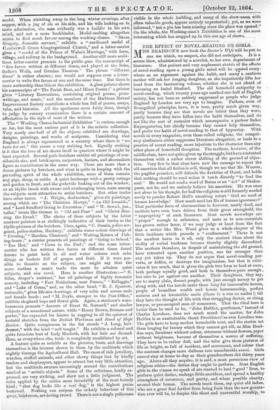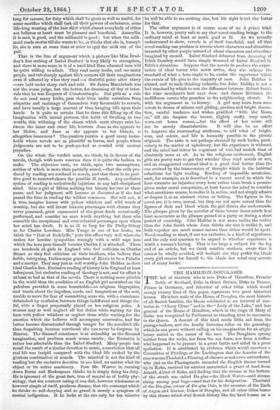THE EFFECT OF NOVEL-B.EADING ON GIRLS. long for careers, for
duty which shall be great as well as useful, for some sacrifice which shall task all their powers of endurance, some life-long wearing of the hair shirt which almost everybody of either sex believes at heart must be pleasant and beneficial. Amaryllis, it is said, is good, and the milkmaid is good ; but when the milk- maid reads stories till she wants to be, or thinks that she is, Amaryl- lis, she is sure at some time or other to spill the milk out of the pail.
That is the line of argument which a picture like Miss Brad- don's fine etching of Isabel Sleaford is very likely to strengthen, and there is more sense in it of a hard kind than educated men will be quite willing to admit. They read many books, and see many people, and-rub sharply against life's corners till their imaginations even if affected by what they read—a doubtful point after thirty —are held tinder sharp curb and rein. Sir James Mackintosh was not the worse judge, but the better, for dreaming all day at inter- vals that he was Emperor of Constantinople. But girls as a rule do not read many books, pass their lives under restraints from etiquette and espionage of themselves very favourable to reverie, and have usually a large amount of time hanging idle upon their hands. Is it quite so certain that to them this filling up of the imagination with unreal pictures, this habit of dwelling in two worlds, this widening of the chasm which must always exist be- tween the inner and outer life, b3tween Jean as she appears to her Maker, and Jean as she appears to her friends, is altogether innocuous? The question puzzles a good many house- holds where novels are as plentiful as loaves, and people whose judgments are not to be pooh-poohed as crusted with ancient prejudice.
On the -whole the verdict must, we think, be in favour of the novels, though with more reserves than it is quite the fashion to make. The objection rests, we think, upon two assumptions, neither of which is more than partially sound,—that the evils pro- duced by reading are confined to novels, and that there is no posi- tive good to counterbalance the possible ill result. Any exclusive system of reading is undoubtedly injurious to any half-disciplined mind. Give a girl of fifteen nothing but history for two or three years, and her judgment will become as distorted as if she had passed the time in reading the wildest romances. She will not, it is true, imagine heroes with yellow whiskers and wild words of worship, but she will invest historic personages with charms they never possessed, grow enamoured of the great deeds occasionally performed, and consider no man worth anything but those who resemble the exceptional and over-coloured personages upon whom her mind has dwelt. It is as ill to long for Sir Philip Sidney as for Charles Lovelace. Miss Yonge in one of her books, we think the "Heir of Iledclyffe," puts this effect very well when she makes her heroine sympathise strongly with a wild rage into which the hero puts himself because Charles I. is attacked. There are hundreds of girls in England who feel criticism on Charles Stuart as they feel criticism on their brothers, who believe that feeble, intriguing, Italianesque grandson of Rizzio to be a Paladin and a martyr. They may just as well worship John Halifax as their ideal Charles Rex. Exclusive reading of history is in England at least infrequent, but exclusive reading of theology is not, and its effect is at least as bad as that of the novels. There is nothing more pitiable in the world than the condition of an English girl nourished on the pabulum provided in some households—on religious biographies, and tracts about the impulses, needs, and temptations of the soul, unable to move for fear of committing some sin, with a conscience debauched by confusion between things indifferent and things sin- ful, with a finger perpetually placed on her religious pulse. A woman may as well neglect all her duties while waiting for the hero with yellow whiskers as neglect them while waiting for the emotion which she believes will accompany conversion, had far better become discontented through hunger for the novelist's life than despairing because convinced she can never be forgiven by Heaven. The diseased conscience is as unhealthy as the diseased imagination, and produces much worse results ; the Exstatica is rather less admirable than the Isabel Sleaford. Many people can recall the result of a similar devotion to music, a conviction that all real life was insipid compared with the ideal life evoked by the glorious combination of sounds. The mischief is not the kind of reading but the exclusive devotion to one kind, no matter what its object or its active machinery. Poor Mr. Weaver in running -down Burns and Shakespeare thinks he is simply doing his duty. He is ignorant of the great fact, true of mental as of bodily phy- siology, that the constant eating of one dish, however wholesome or however simple of itself, produces disease, that the contempt which he thinks so self-denying and so grand is merely a symptom of mental indigestion. If he looks at the sun only for ten minutes
he will be able to see nothing else, but his sight is not the better for that.
The other argument is of course more of an A priori kind. It is, however, pretty safe to say that novel-reading brings to the ordinary mind at least as much good as ill. As we recently endeavoured to show, reverie is of itself beneficial, and all that novel-reading can produce is reverie about characters and situations invented by other people instead of about characters and situations imagined by oneself. Isabel Sleaford debarred from dreaming of Edith Dombey would have simply dreamed of Isabel Sleaford in Edith's situations. Suppose that the novels do produce the expec- tation of ideal heroes who never arrive, they also enlarge the standard of what a hero ought to be, confer the experience which the events of life give to the majority of men. John Halifax is absurd, and to male thinking imbecile, but John Halifax is not a bad standard by which to test the difference between Robert Smith the wine merchant's heir next door, and James Robinson the mellifluous curate who preaches in the neighbouring church. So with the argument as to luxury. A girl may learn from some novels to dream of saloons and gilding, gardens and bright decora- tion, careful tendance and wishes gratified "with the bloom on," till she despises the brown, slightly stuffy, very nearly worn-out home rooms,—but the effect of her scorn will not be merely dissatisfaction. It will also be an effort to improve the surrounding stuffiness, to add what of bright- ness, and colour, and life is humanly possible to the prosaic originals. The taste is not perhaps elevated by such books, parti- cularly in the matter of upholstery, but the experience is widened, and the mind had better be cognizant of two bad models than of absolutely none at all. As to the religious excitement, English girls are pretty sure to get that whether they read novels or not, and an exaggerated external ideal is a good deal better than the one evolved by the introversion of thought which is the habitual substitute for light reading. Reading of impossible asceticism, such, for example, as is described in a recent novel in which the hero commits an injustice every hour rather than break a promise given under moral compulsion, at least forces the mind to consider what asceticism means, to realize it in action ,and not simply admire or despise it as an abstract virtue or failing. The figures in the novel are, it is true, unreal, but they are not more unreal than the figures of flesh and blood which the girl thinks she understands. The glimpse given by the novelist of these heroes' inner minds is at least as accurate as the glimpse gained at a party or during a short period of courtship. John Halifax is not more unlike the reality than the John Smith whom Jean thinks she sees is unlike it, and both together are much nearer nature than either would be apart. Novel-reading in short, if not too exclusive, is a kind of experience, and the only real question to be argued is whether experience is worth a woman's having. That is too large a subject for the fag end of an article, but we think sensible mothers, aware that it cannot be wholly avoided, will hesitate ere they prefer the ideals every girl creates for herself to the ideals her mind may accrete out of many books.































 Previous page
Previous page